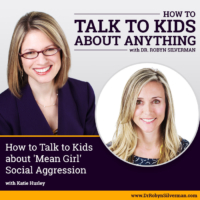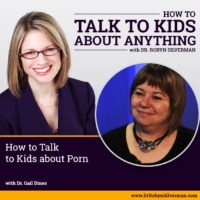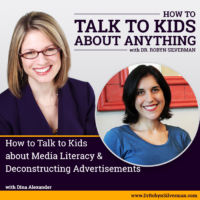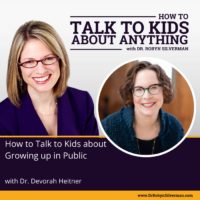Podcast: Play in new window | Download
Subscribe: Apple Podcasts | RSS | More
How to Talk to Kids about Transgender People
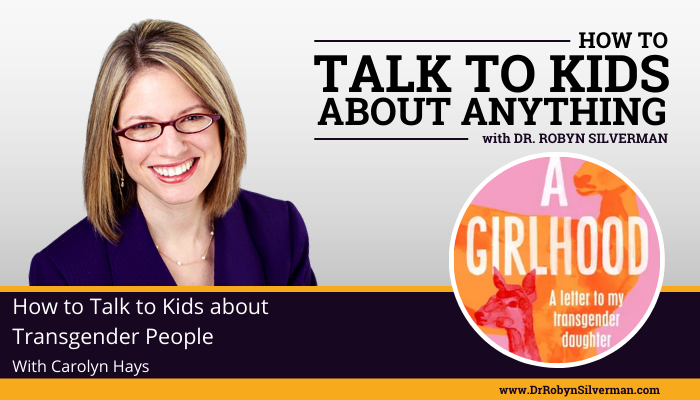
Imagine getting a knock on your door from someone who could derail your whole life and take away your child. That knock came for my next guest—not because she was abusing or neglecting her child, actually, quite the opposite- it was because she was listening and responding to her child in the most loving way possible. She was allowing her child to live life as the gender she felt she was—a girl. The topic of transgender youth has been contentious, to say the least. From the outside, when the person looking in is cis gender—meaning you were say, born and labeled a girl at birth and, you feel like a girl, it can be hard to imagine that some people don’t feel that alignment. The only way that I feel like we can really explain that is to switch it– for you to imagine that other people are referring to you, if you are a girl or a woman, as a boy or a man—with pronouns that reflect that, names that reflect that and you keep saying, but that’s not who I am! Some kids know from a very young age that they are not the gender they were assigned at birth. And it’s important to listen to this—because transgender people can have a very high suicide rate- a very high rate of being bullied, attacked, even murdered. Trans women, because they must contend with a profound amount of discrimination, also are at high risk of alcoholism, poverty, homelessness and lack of good healthcare. The solution is not fixing the transgender person but rather, acceptance. Let’s talk about it with my next guest who has personal experience with her own transgender child.
Guest Expert: Carolyn Hays
Imagine getting a knock on your door from someone who could derail your whole life and take away your child. That knock came for my next guest—not because she was abusing or neglecting her child, actually, quite the opposite- it was because she was listening and responding to her child in the most loving way possible. She was allowing her child to live life as the gender she felt she was—a girl. The topic of transgender youth has been contentious, to say the least. From the outside, when the person looking in is cis gender—meaning you were say, born and labeled a girl at birth and, you feel like a girl, it can be hard to imagine that some people don’t feel that alignment. The only way that I feel like we can really explain that is to switch it– for you to imagine that other people are referring to you, if you are a girl or a woman, as a boy or a man—with pronouns that reflect that, names that reflect that and you keep saying, but that’s not who I am! Some kids know from a very young age that they are not the gender they were assigned at birth. And it’s important to listen to this—because transgender people can have a very high suicide rate- a very high rate of being bullied, attacked, even murdered. Trans women, because they must contend with a profound amount of discrimination, also are at high risk of alcoholism, poverty, homelessness and lack of good healthcare. The solution is not fixing the transgender person but rather, acceptance. Let’s talk about it with my next guest who has personal experience with her own transgender child.
Carolyn Hays is an award-winning, critically acclaimed, bestselling author who has chosen to publish A Girlhood: Letter to My Transgender Daughter under a pen name to protect the privacy of her family. Her novels have been published by Hachette, Simon and Schuster, and HarperCollins; her books are also widely translated. A Girlhood will have four overseas editions, including those by Picador UK and Flammarion in France. Her past books have been listed as New York Times Notable Books of the Year and Kirkus’s Best Fiction of the Year, and she’s written for National Public Radio and the Washington Post.
Important Messages:
- There was this kind of violent contraction and then, you know and a real targeting of trans people especially when the Trump administration came in, but you know, down to the governor of Texas this past spring making it a law to investigate all parents who support their transgender kids to investigate them for child abuse. So we, you know, the, the book as I was, as I was writing it and working on it has suddenly become more and more urgent.
- Our daughter was, as they say, persistent, consistent and acute. All of her expression, (well, at that point we were using male pronouns,) but all of her expression was, was female. All of her play was female. But she was getting in arguments at school as a really young kid, like pre-K, telling her teachers that she was a girl telling the other students that she was a girl.
- If she would hear me talking to my mom using male pronouns, she would, you know, you know, shout out, ‘I’m a girl.’
- My daughter was actually very much understanding her gender and hitting all those markers in childhood development. It just was surprising because she was doing them the way I did as a girl and not in the way that would be most typical.
- What about the people who say, well, why couldn’t she just be like an effeminate boy? (Yeah, that was us too. So you know, we have an oldest daughter who was 12 when our youngest was born and then two brothers two, she has two older brothers. Our house was full of boy toys and some girl toys too. We were very open to the idea. All of our other kids are pretty, gender typical, and so we were very open to the idea that, maybe we’re raising you know a boy who likes girl things. And that phrase was actually given to us by somebody who was a specialist in this area and told us that the most likely we are raising a feminine boy, just statistically speaking.
- Taught to try this language: “You’re a boy who likes girl things.” “There’s nothing wrong with being a boy likes girl things.” We tried and you she really rejected that. And in her behavior it became clearer and clearer to us that this was much deeper than the things that I like to play with, and this is the thing I would prefer to wear. So we started to listen in a deeper way.
- Knock at the door: We eventually let our child, she asked her pronouns to be changed. And we were talking and hearing that this was probably the best way for her to be in the world.
- We transitioned to just to girl pronouns, her hair, she gets to choose her clothes and a nickname. We had started to tell people at school, the school was very happy and relieved that we had a plan and, and they worked with us. And, and we were telling neighbors and family and friends that this was the change that we were trying out.
- that knock on the door was from the department of children and families. It was an investigator who had gotten an anonymous call-the person who made the call didn’t have that education- they were using language like we were forcing our child to be a homosexual or something like that
- we quickly realized because we were in the deep south in a red state that if we went forward with Republican appointed judges and that we could lose custody.
- it turned out that, that the person who investigated you had so much support from so many people. And that was a big surprise of the outpouring of love and support from so many people that the, the person who was investigating was frustrated that he was even there, it sounded like that he needed to investigate a good family like yours when there were people who actually needed him. And eventually that case was closed.
- Faith: I’m also Catholic and so I come to all of this with faith. It’s been an incredible journey for me in terms of my faith. I think about the way we’re all made and our pediatricians early on said when I explained the situation said, nature loves diversity.
- Brain Science: I’ve just done the deep dive into the incredible architecture of our brains and you know, the neurological, the endocrine system, the hormone wash that a baby is bathed in the womb and all the rich, beautiful complexity of us as human beings. And then to kind of deny all of that and just decide, no, it has to be these two boxes. One is F and one is M and you’ve gotta choose one. And, you know, gender has to be something that you glance at somebody as a baby, and, you know, to me, all of that is so reductive and so limiting and boring. And to me, it really, it snubs God in a way, because here we are such a complex and beautiful creation and so to reduce all of that and to deny it to me is to reduce and deny what’s beautiful about us. If I were reaching across the aisle to somebody, somebody who was also a person of faith, I might start there. If I was talking to somebody who was more science based, I’d just dive into the brain.
- Warning to their child about dangers. Boston children’s hospital: The doctors at that gender clinic were getting death threats, and they eventually, there was a bomb threat, which the people who were investigating it felt, was tied directly to the threats against the gender clinic and the work that they were doing. Because people had really been targeted with some misinformation about what they were, how they were caring for kids there.
- Private vs Secret: Difference between what’s private and what’s a secret that we all have a right to have privacy and that her decision of who she talks to about being trans, (because right now she, she is not visibly trans. No one would look at her and think, oh, that, you know, that’s a, that’s a trans person) is hers to choose. So we talk a lot about privacy versus secrecy, which feels like, kind of like a heavy weight. Sometimes it’s like a stone- you give that stone to somebody and they can hit you with it. Secrets are a little bit trickier. But at the end of the day, some of that is just language.
- I’m always telling her to trust your instincts of people. If you get a strange feeling about someone, trust that strange feeling. Be wary. She’s a great read on people. And I think that comes in part from being different. And so, yeah, she walks into a room. She’s got a much clearer read in terms of who trust and who not to. So we really try to have her lean into that and really trust herself and draw boundaries for herself.
- Talk to Kids: I really liked your intro of this podcast- how would you feel if somebody were constantly calling you, sir, and Mr. if you identity as a girl/woman? Kids get that really fast. Just explain it to them. Kids get it– it’s the parents who kind of get in the way. So for the parents who really want to do a good job, it’s just treating people with respect across the board and in this situation being no different.
- Pronouns: It’s a really big deal! A way of treating someone with the respect we all deserve. And when we get it wrong, there are ways to correct yourself really quickly and not make a big thing of it. Everybody makes mistakes. Just being gracious with that is important, especially when it’s new but really making an effort to get it right. And really like doing some work to reimagine that person, if somebody’s going through a transition reimagine them in your downtime to practice those pronouns. You can just practice it and then it just becomes a habit that sticks.
- Trans jokes in media: There was an instance in your book where you’re watching a movie with Cuba Gooding Jr. And there were some transphobic jokes that were made and I can imagine parents and kids being in that exact situation where they hear a transphobic joke in a movie or, or a show or a comedian is saying it or whatever it might be, what would you hope parents would do or say in that type of situation so that kids don’t get the idea that making fun of trans people is funny or okay.
- Acknowledge that it’s messed up. “That was messed up.”
- Comedians and punching down: The lazy comedian will pick a target and kind of punch down on somebody. It means that they’re kind of above them and they’re punching down on a demographic. It’s much better when comedians make fun of themselves, so that’s fair. And there are a lot of great comedians who are trans, who are telling really funny jokes about their experience. When somebody tells a joke from their own community, it’s just a smarter joke, because they’ve lived it and they know how to tell the joke better.
- Media- secret: You know, all the Nickelodeon shows the Hannah Montanas of the world, the earlys Zaya, Waverly place, there’s so many different shows where someone has something special about them that they can’t quite talk about. And then eventually they’re kind of found out. I think in all the different ways that people are different, whether that’s like neurodiversity or, you know, different, there’s all different ways that we have something that makes us really special.
- Across the board for kids who feel a little bit different, or just feel like their specialness has not fully been realized yet, but they know it’s there. I think those shows are, are kind of interesting and good for kids across.
- Any conversation where you’re talking about what are the rules of gender, just acknowledging that they exist much less at somebody, somebody is moving between them or in between them, not feeling one way or another way. I think all those conversations are great for everyone.
- We’re irrational about gender as a culture. We’re really seeing that irrationality play out and being cynicall stoking the fires of that irrationality when it’s so unnecessary and using it to divide people to talk using trans kids and trans people to divide and create fear. I just find that to be in a lot of arenas where I’m seeing it to be pretty cynical act purposeful and not really worried about trans people causing problems, but just using fear around gender to, to stoke some, to stoke some you know, real divisions.
- She’s 15 now and you know, thriving, getting good grades she’s excels in French and got an award.
- I think it’s just such an opportunity be compassionate. And what I’ve learned, the lessons that I’ve gotten, the way my daughter has opened me up to the world is what I love, because so many times the lesson that I’ve learned, I can take it to another group of people and say well, I know how they feel. I know why they are reacting so strongly, you know, in, in defense of their child, I understand why they’re fighting for that child and the way that they are, why they seem really triggered at this moment. Cause there’s been a lot going on. And so, so I think that there’s any time someone is from a minority or is it’s in some way different it opens us all up and if we listen really well, all those lessons are transferable. So it’s been great for me to just to be a broader thinking person. And really is she’s kicked the, the doors of my heart wide open, you know in terms of how to listen and how to love.
Notable Quotables:
- I was taught to try this language: “You’re a boy who likes girl things” and “There’s nothing wrong with being a boy likes girl things.” We tried and you she really rejected that. In her behavior it became clearer and clearer to us that this was much deeper than ‘the things that I like to play with,’ and ‘this is the thing I would prefer to wear.’ So we started to listen in a deeper way.
- I’ve just done the deep dive into the incredible architecture of our brains and the neurological, the endocrine system, the hormone wash that a baby is bathed in the womb and all the rich, beautiful complexity of us as human beings. And then to kind of deny all of that and just decide, no, it has to be these two boxes. One is F and one is M and you’ve got to choose one. To think that gender is something that you learn from just glancing at somebody as a baby… to me, all of that is so reductive and so limiting and boring. And to me, it really, it snubs God in a way, because here we are such a complex and beautiful creation and so to reduce all of that and to deny it to me is to reduce and deny what’s beautiful about us.
- “We have to talk about the difference between what’s private and what’s a secret. We all have a right to have privacy. It’s her decision to make who she shares it with because privacy is like a stone- you give that stone to somebody, they can hit you with it.”
- “When talking to our kids about trans kids, it’s just about treating people with respect across the board and in this situation it’s no different. To listen to people and to treat them the way that they want to be treated and seen is really important. Those pronouns, if you’ve always gotten the right pronouns, your whole life, it feels like, oh, well, it’s no big deal. But it really is a big deal.
If you are a parent of any child, learning about the LGBTQ community, learning how to make your home one that is loving and welcoming to people of all sexualities and gender identities is so powerful, says @kristinnoeline on #talktokids
Click To Tweet
Using your kid’s name and pronouns is a very clear way of saying I recognize you, I believe you, I accept you, I love you says @kristinnoeline on #talktokids podcast
Click To Tweet
Resources:
The post How to Talk to Kids about Transgender People with Carolyn Hays appeared first on drrobynsilverman.com.

